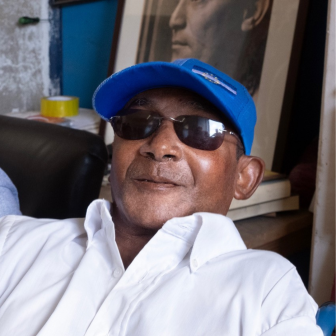
Luís Lima
During the main readings of festival poets, each poet will receive the undivided attention of the audience for the duration of the program. The poets have pre-picked a selection of poems, which they will read in its entirety during their main reading. After the reading, there will be time to ask the poets questions about their work that you've always wanted to know the answer to!
Collaborations with musicians such as Ramiro Mendes, Paulino Vieira, Toy Vieira and Vaiss make Luís Lima one of the most important poets of Cape Verde, with songs recorded by the most important interpreters such as Cesária Évora, Bana, Ildo Lobo and Tito Paris.
Luís began writing poems as a child at the age of eight. At that time, he was struck by juvenile rheumatism/arthritis, the disease that would change his life and later leave him paralyzed. At the age of 27, he also lost his eyesight. But neither immobility nor blindness have ever hindered his ability to observe and attune to everyday life and the...
During the main readings of festival poets, each poet will receive the undivided attention of the audience for the duration of the program. The poets have pre-picked a selection of poems, which they will read in its entirety during their main reading. After the reading, there will be time to ask the poets questions about their work that you've always wanted to know the answer to!
Collaborations with musicians such as Ramiro Mendes, Paulino Vieira, Toy Vieira and Vaiss make Luís Lima one of the most important poets of Cape Verde, with songs recorded by the most important interpreters such as Cesária Évora, Bana, Ildo Lobo and Tito Paris.
Luís began writing poems as a child at the age of eight. At that time, he was struck by juvenile rheumatism/arthritis, the disease that would change his life and later leave him paralyzed. At the age of 27, he also lost his eyesight. But neither immobility nor blindness have ever hindered his ability to observe and attune to everyday life and the problems of society and individuals who move and see. Luís Lima's lyrics breathe either the loving lyricism of the morna tradition or a sharp humor in social criticism, of which the irony about café intellectuals, the title track of the album Intelectual (2001), by Ildo Lobo, is a good example. At the age of 14, Luis Lima moved to Portugal, where he remained for many years. He currently lives in São Vicente.
However, he says that everything he writes is based on Africa and Cape Verde, the (Cape Verdean) woman and children. He thinks of Nelson Mandela when he composed “Uma lagrima e amor”, writes a morna about the mothers of drug addicts (“Voz erguida d'um mae”), he pokes fun at the bald head of Ramiro Mendes (“Ser bald”) and brings humor into his texts about traditional Cape Verdean riddles ("What what"). It was Paulino Vieira who first challenged him to write lyrics for music in the 1980s. The result was 'Dôr di nha dôr', soon recorded by Bana, the king of morna. Later this became the title of a collection of poems. Other composers interested in translating his poetry into music followed. Cape Verdean gituarist and composer Vaiss has an album in which ten of the eleven songs are collaborations between the two. Toy Vieira, Paló and Ramiro Mendes are other renowned producers and musicians with whom he collaborated extensively.
Saturday June 8th
14.15 - 14.45
LantarenVenster - Auditorium 5
Pricing
Buy a day- or passe-partout-ticket via the link above.
Language and duration
Language: Portuguese
Duration: 30 minutes
Festival poets
Sponsors














